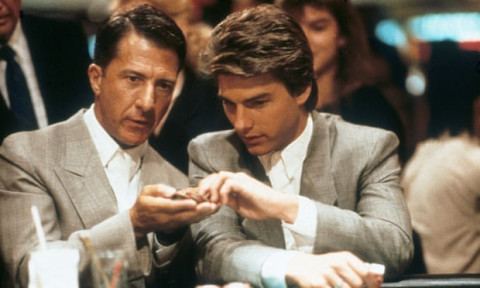
Thirty years on, the ‘autistic savant’ portrayed by Dustin Hoffman still represents most people’s idea of autism
After Rain Man was released on 16 December 1988, the whole world knew what “autistic savant” meant. Despite spending years in development hell, and test screenings fostering tepid and confused responses, Rain Man was a runaway success. It swept the Oscars, winning best picture, best original screenplay, best director and best actor for Dustin Hoffman’s portrayal of Raymond Babbitt.
Rain Man’s influence on how autism is thought of culturally is incalculable. But an influence, however benign or well-intentioned, can become suffocating if allowed to flourish for too long. What was once liberating can become irritating and constricting: so 30 years after the film’s release, was it a blessing or a curse for the autistic community?
Rain Man at 30: damaging stereotype or 'the best thing that happened to autism'?
Before Rain Man, there was no popular conception of what autism looked like, among the public or on-screen. At that point autism was an abstraction, understood only by dedicated parents or specialised clinicians. In Rain Man, this widespread ignorance is exemplified by the moment when Charlie Babbitt (played by Tom Cruise) attempts to consult a psychiatrist about Raymond, his brother. A nurse asks, “He’s artistic?” Charlie replies, “No, he’s autistic.” The nurse says, “I’m not familiar with that, what is the exact nature of the problem?”
Autistic people’s only advocates were their parents, and even this situation was far from a given. Autistic people were often institutionalised. Groups of parents fighting for their children’s rights and freedoms had been working in the dark for decades. Then, suddenly, everyone around them knew the word that had previously been theirs and theirs alone – autism. Suddenly everyone knew Raymond Babbitt, and Babbitt quickly became a cultural shorthand for autism.
Rain Man remains Hollywood’s only runaway success with an autistic character. In the 30 years since its release, no film or TV show involving an autistic character has matched the commercial and critical success of Rain Man, and this has allowed it to attain a unique kind of cultural staying power. Media is immensely powerful, and films penetrate our cultural consciousness more potently than any other art form. Many people’s conception of psychiatric wards comes from One Flew Over the Cuckoo’s Nest, and many people’s conception of autism comes from Rain Man. Rather than being viewed as a single iteration of autism, Raymond Babbitt became autism.
The film has become such a shorthand, that I and every autistic person I know immediately has to caveat the statement “I’m autistic” with “I’m not Rain Man”. Autistic people are frequently met with the same question that a doctor asks Raymond in the film: “Does he have any special abilities?” Rain Man was also the birthplace of what has now become a common trope of autistic portrayals in film and TV: autistic savants. The most recent incarnation of this is Shaun Murphy, played by Freddie Highmore, in The Good Doctor. The idea that all autistic people are geniuses, or that they all have savant abilities such as extraordinary memory, is a myth, a myth that is largely alive and kicking today due to Rain Man. Yet the cultural stereotype of Raymond Babbitt, the autistic savant, persists.
Autism on film: can cinema get it right?
But Rain Man’s ubiquity and its influence is hardly the film’s fault. The blame lies with the wider industry. Rain Man should have been a cultural beginning for autistic characters on screen. Instead it became a singular event, an end point. And while there have been some notable exceptions (such as Max, voiced by Philip Seymour Hoffman, in Adam Elliot’s brilliant film, Mary & Max) autistic characters have shown no signs of straying from the Babbitt formula.
As a beginning for autism on screen, Rain Man deserves applause. It gave autistic people a visibility that had previously been denied them. In one fell swoop Rain Man achieved almost overnight the kind of representation that parent advocacy groups had been working towards for decades. But as the dominant depiction of autism on screen, it also deserves derision. The autistic community is more than Raymond Babbitt. While this wasn’t apparent in 1988, it is clear now, and yet, 30 years on, Rain Man’s enormous influence on autistic characters on screen shows no sign of abating. Rain Man continues to affect autistic lives, whether we like it or not.